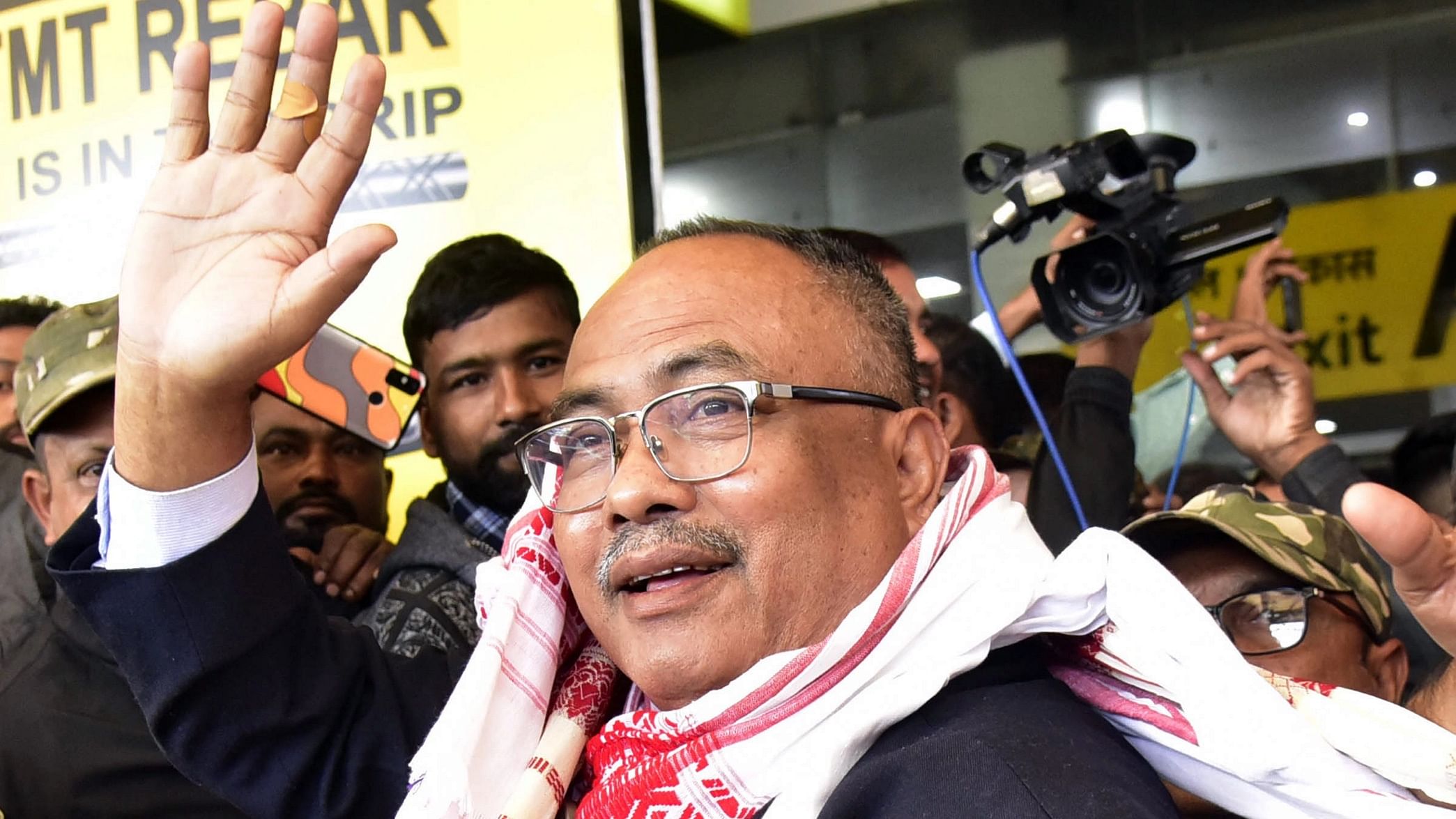
United Liberation Front of Asom (ULFA) chairman Arabinda Rajkhowa arrives at Lokpriya Gopinath Bordoloi International Airport after the signing of a peace accord between ULFA and the central and Assam governments in Delhi, in Guwahati, Sunday, Dec. 31, 2023.
Credit: PTI Photo
Guwahati: Leaders of insurgent group ULFA on Sunday said that the crackdown against Indian insurgent groups by the "pro-India" Awami League government in neighbouring Bangladesh pushed them towards no option but to join the peace talks with the government in 2011.
"The situation suddenly changed in Bangladesh after Sheikh Hasina's Awami League won the elections in 2008 and formed the government. The Awami League government decided to help India by removing all camps of Indian rebel groups as India had helped them during their Liberation War in 1971. There was red-corner notices against all of us and life-size photographs were put up in the airports," ULFA's ‘foreign secretary’ Sashadhar Choudhury, told reporters in Guwahati, two days after ULFA signed a pact with the government bringing the curtain down to the 44-year-long "armed movement" and the peace talks that began in 2011.
Choudhury was among a group of senior ULFA leaders, who were arrested in Bangladesh and were handed over to India in 2010. ULFA chairman Arabinda Rajkhowa, ’finance secretary’ Chitraban Hazarika and ’deputy military chief’ Raju Baruah were lodged in Guwahati jail along with Choudhury. ULFA vice-chairman Pradip Gogoi, ’publicity secretary’ Mithinga Daimary and ’cultural secretary’ Pranati Deka were already lodged in the jail. ULFA ’general secretary’ Anup Chetia was similarly handed over to India in 2015 and he joined the peace talks with the government, which began in 2011.
"We realised that Bangladesh was no longer a safe haven for us. But we had no place to go, already we were driven out from Bhutan in 2003. We became directionless as most of our leaders were caught and jailed one-by-one. Our military chief Paresh Baruah was in another country. In that situation, we had no option but to reciprocate to the initiative for talks taken by the civil society organisations in Assam," Chetia told reporters on Sunday. The "Operation All Clear" launched in 2003 in Bhutan flushed out Indian insurgents belonging to both ULFA and those in the Bodoland region. Bodoland-based insurgent groups signed a pact in 2003 and in 2020.
ULFA was formed in April 1979 with a demand for "sovereign Assam" amid the Assam Agitation (1979-1985), which was launched to solve the problem of "large scale illegal migration" from neighbouring Bangladesh. ULFA leaders had similarly visited New Delhi for talks in 1992 but had pulled out after the Centre reportedly asked them to surrender their weapons before signing a pact.
While ULFA leaders signed the pact on December 29 in New Delhi, the Paresh Baruah-led faction, which was named ULFA-Independent, is reportedly in Myanmar, considered the last shelter for insurgent groups in the Northeast. ULFA-I is still bent on its demand for discussion on the subject of "sovereignty of Assam."
No to politics:
Choudhury said ULFA leaders would not join politics like leaders of several other insurgent groups in Assam had done in the past. "We believed in armed movement but we lost there. So as soon as ULFA is disbanded in a few weeks, we will go back home," Choudhury said.
Hope from delimitation
Talking about the criticism they faced over the pact not addressing the threats posed to the indigenous Assamese people, Chetia said the delimitation exercise conducted in Assam by the Election Commission in 2023 encouraged them to sign the pact. "We had demanded that 102 of the 126 Assembly seats in Assam should be reserved for the indigenous people. The recent delimitation has ensured the guarantee of protecting 97 Assembly seats for the indigenous people. This will ensure political rights of the indigenous people. The government has also assured us in writing to request the Election Commission to follow the same methods of delimitation in Assam in the future too," he said.
The pact also assured to protect territorial integrity of Assam, thus negating the possibility of bifurcation of the state to fulfill the demand for creation of a new state like the Kamatapur state for the Koch Rajbongshi community. It also promised financial support of 1.5 lakh crores for development and rehabilitation of 726 ULFA cadres, beside others.